- Home
- Fredric Brown
Mostly Murder Page 2
Mostly Murder Read online
Page 2
But Len had been only a few steps away, and I’d been across the street. I saw him swing wildly and miss, and then an auto horn and squealing brakes made me step back just in time to keep from getting killed in the middle of the street. When I looked again, the tableau had changed. The big butcher was standing behind Len, with Len’s arm doubled in a hammerlock. Len’s face was red with either pain or futile anger, or both.
I took a quick look for traffic both ways this time before I started across toward them. I don’t mind telling you that I was afraid. Not physically afraid of that butcher, but—well, there was something about him that had made me want to hit him, even before Len had come along, but that made me afraid to do it, too.
Suddenly I noticed that Kathy and the dwarf were with me, Kathy abreast of me on one side, and the dwarf scuttling by me on the other side, his short legs going like piston rods as he passed me.
“Let go of him, Kramer, damn you!” he was yelling.
The butcher let go of Len, and Len almost collapsed, leaning back again the building. The dwarf got to Len first, and reached into Len’s vest pocket. He came out with a little box of pills. He handed them to me.
“Give him one, quick,” he said. “I can’t reach.”
I got the box open—they were nitro pills, I noticed—and got Len to take one.
“Take him across to my place,” the dwarf was saying. “Make him sit down and rest.”
And Kathy was on Len’s other side and we were helping him across the street.
The dwarf wasn’t with us. I saw that Len seemed to be breathing normally and making it all right, then I glanced back over my shoulder.
Again it was a conversation I couldn’t hear, but could see. The dwarf’s face, on a level with the butcher’s belt, was dark with fierce anger. There was smiling amusement on the butcher’s face, and again I felt that impact of evil.
The butcher said something. The dwarf took a step forward and kicked viciously at the butcher’s shin. He connected, too.
I almost stopped, thinking I’d have to let Kathy support Len while I ran back to rescue the foolhardy dwarf.
But the butcher didn’t make a move. Instead, he leaned back again the door post of his shop and laughed. Great peals of loud laughter that must have been audible a full block away. He didn’t even lean down to rub his kicked shin. He laughed.
He was still laughing when Kathy and I had taken Len through the open doorway of the restaurant. I turned around and the dwarf, his face almost purple with thwarted anger, was crossing the street after us, and the butcher still stood there laughing. It wasn’t a nice laugh at all. It made me want to kill him, and I’ve got a pretty even disposition myself.
We let Len down into one of the seats at a booth, and the dwarf was beside us, his face calm again. I glanced out through the window and saw that the butcher was gone, probably back into his shop. And the silence, after that laughter, seemed blessed.
“Shall I get Doc?” the dwarf asked Len. Len Wilson shook his head. “I’m all right. That nitro pill fixed me up. Just let me sit and rest a minute or two.”
“Cup of coffee while you’re resting?”
“Sure,” Len said. “And make me a hamburger, will you, Joe? Haven’t eaten much.”
Kathy sat down across from Len in the booth and I went back with the dwarf named Joe. He went up the ramp that led to the raised area back of the counter and he again wasn’t a dwarf any more. He was five feet tall and his eyes were higher than mine as I sat at one of the counter stools opposite the hamburger grill. He took a hamburger patty from the refrigerator and slapped it on the grill, and then I caught his eye.
“What,” I asked, jerking my thumb in the direction of the butcher shop, “was that?”
“That,” he said, “was Gerhard Kramer.” He made it sound like profanity.
“And who is Gerhard Kramer?”
“A nice guy,” he said, “if you listen to some people who think so. Most of us don’t. Some of us are pretty close to thinking he’s the devil himself.”
“Outside of a butcher,” I asked, “who is he? What was he?”
“Used to be with Corby’s circus. Sideshow magician and mentalist. He makes a better butcher. But he still keeps on with magic—only the black kind, the serious kind.”
“He really believes in it? Wax dolls and that sort of stuff?”
“You saw that doll, then? Well, he makes people believe he believes in it. Got half the town scared stiff of him.”
“Yet they buy in his store?” He flipped over the hamburger frying on the grill.
“They’re afraid not to, I guess, if it comes to that. Oh, and some of the women aren’t afraid of him. He’s attractive to women. He does all right. He owns a good share of the town. Probably likes cutting up dead animals or he wouldn’t have to run that shop. Yeah, he does all right.”
Something in his tone of voice made me ask, “Except what?”
He slit a bun and put the hamburger in it, drew a cup of coffee, and started around the counter with them. I stayed still. I knew he’d answer my question when he got back.
He came back and said, “Len’s wife, mister. That’s the one thing he wants and can’t have.”
“Dorothy?” I asked, surprised. I don’t know why I was surprised.
He looked so puzzled that I realized he hadn’t known that we had stopped at the Wilsons’ place on our way into Corbyville. He had thought that our first sight of Len had been across the street. I told him about it.
“Yes, Dorothy,” he said. “She was a town girl before she married Len. Kramer wanted her and Len took her out from under his nose. Kramer’s hated Len ever since. And, damn him, he’ll probably get her if Len isn’t more careful of himself. He’ll keel over and leave a clear field.”
“But won’t Dorothy Wilson have something to say about that?” I asked. “Would she marry a—a guy like Kramer?”
He looked gloomy. “I told you women like him. She likes him—can’t see anything wrong with him. Oh, I don’t mean she’d cheat on Len, or anything like that. But if Len would die, why, after a year or so—”
“And that doll,” I said. “That wax doll. Does that mean Kramer doesn’t want to wait until Len dies naturally, if he does? Does Kramer really believe in that land of magic?”
The dwarf looked at me cynically. “Sometimes that kind of magic can work, mister,” he said. “You saw it blame near work just now, when he showed it to Len.”
I saw what he meant. I got up and went back to the front of the store. Len looked better, and Kathy was talking to him animatedly.
“I’ve just learned Len plays chess, Bill,” she said. “He’s a friend of Joe Laska—that’s the man who runs the restaurant here—and says they play a lot. We could have played a game out at Len’s house while we were there.”
“Sure,” I said, “only you didn’t. How’d you come out on the game with Joe? You were a knight ahead, I remember, and I see he put the board back, so I guess you finished the game.”
“Yes, we finished. We were coming out to join you just when—when the trouble started across the street.”
With Len sitting there I didn’t want to go into that; I’d tell Kathy later what it was all about. “Who won?” I asked quickly.
“Joe, darn him. That business of giving me the knight was a gambit. He checkmated me four moves later.”
Len grinned, a little weakly. “Joe’s a great guy for those gambits, lady. If you play with him again, watch out any time he offers you a piece for free.”
The dwarf came back then and said that he was going to get a car to take Len home. But I wouldn’t hear of that, of course. I made Len get into my car—he could walk all right by now—and Kathy and I drove him home.
Dorothy Wilson took a look at Len as he came through the door and took him off upstairs to put him to bed for the rest of the day. She had called back, asking us to wait, and we did.
But when she came down it turned out she had wanted us to wait so she co
uld offer us something to eat, and we explained that we had just eaten in town. So Dorothy walked out to the car with us.
“Joe Laska phoned me,” she said. “He said—well, I gathered that Len tried again to start a fight with Gerry Kramer. Oh, I wish Len wouldn’t be so foolish. To hear Len—and Joe, too—talk, you’d think Gerry was a devil or something.”
Something made me ask, “And isn’t he?” She laughed a little. “He’s one of the nicest men in town. The men around here don’t like him because he’s handsome and polished and—well, you know how smalltown people are.”
“Oh,” I said. “But he’s nice, really. Why, he holds a mortgage on this place of ours, overdue. He could put Len and me off any time he wanted, but he doesn’t, in spite of the way Len acts about him.”
I didn’t want to hear any more of it. I wanted to say, “Sure, he’d rather let Len stay on a farm and work himself to death than maybe go to a city somewhere and get a softer job where he could last a longer time.”
But I didn’t say it. I had no business to, just because I hadn’t liked a man’s face and his laugh.
We said good-by to Mrs. Wilson and drove off.
After a while, I said, “Women—” disgustedly, and then asked Kathy what she had thought of the butcher.
“I don’t really know,” she said. “He is good-looking all right, and maybe Mrs. Wilson is right, but—well, I wouldn’t trust him. There seemed to be something wrong about him, Bill. Something—uh—wicked, evil.”
And since she was smart enough to have seen that for herself, I told her, as we drove along, everything that I had seen and what Joe, the dwarf, had told me.
We talked about it quite a while. There had been something about that scene in front of the butcher shop, and about the situation back of it, that wasn’t going to be easy to forget. We wouldn’t have forgotten it, I’m sure, even if it had ended there.
But after a while it slid into the back of our minds. We were, after all, on our honeymoon.
We drove to New Orleans and spent a wonderful two weeks in the marvelous fall weather they have there, and I remember the warmth was all the more wonderful when we read in the papers that Illinois and Indiana had been having freezing weather and early snows.
We started driving back then, leisurely. We didn’t plan our route from day to day, and I don’t know whether we would have driven through Corbyville at all, if we hadn’t happened to buy a Centralia newspaper in Metropolis, just after we’d crossed the Ohio River from Paducah.
There was a headline:
BUTCHER LYNCHED IN CORBYVILLE
And in that first story there wasn’t any play-up at all of the “Corbyville Horror” angle that made Sunday supplements all over the country. The lynching—it was the first in a long time in the State of Illinois—was the angle of the Centralia paper.
Apparently the reporters hadn’t actually been on the scene as yet, because there weren’t many details. I read the story out loud to Kathy, then she took the paper away from me and read it again to herself, while I sat and thought, and finished my coffee.
It seemed, according to the Centralia paper, that one Len Wilson, a farmer living just outside Corbyville, had died under rather mysterious circumstances, and that the people of the town blamed the local butcher, Gerhard Kramer, for Wilson’s death. The sheriff, summoned from Centralia, had refused, for lack of evidence, to arrest Kramer.
And while the sheriff was out at the farm a group of townsmen, who had already been out at the farm, yanked Gerhard Kramer out of his butcher shop and strung him up on the light pole right in front of the store. Sheriff’s deputies had been unable to find out who—outside, I suppose, of Kramer himself—had been involved in the lynching.
I paid our check in the restaurant and we went out and got in the car.
“Are you going through Corbyville?” Kathy asked. “Yes,” I said. “I want to know what happened. Don’t you?”
“I guess so, Bill,” she said.
We got to Corbyville about two o’clock. It was a quiet town when we drove down the main street. It was unnaturally quiet.
I drove slowly. The butcher shop, I noticed, was closed, although there wasn’t any wreath on the door. The hamburger stand across from it, the dwarf’s place, was closed too. There, there was a sign on the door that read:
CLOSED TILL MONDAY
I drove on out to the Wilson farm.
There was still an inch of snow on the ground, and it was cold, unseasonably cold for early October. There were cars parked in front—four of them.
We got out and walked back where there was a little knot of men standing beside a fence, and beyond the fence was an open field. I could see the foot prints—the two sets of footprints that the Sunday supplements and all the newspapers made so much of. Alongside of them were other prints now, of course, ones that would not have been there when the first ones were made.
I took a good look at those tracks, without climbing over the fence. You’ve read about them, and they were just what the papers said. Two sets of tracks led out across that snow-covered field; neither set came back. It put a little chill down your spine to look at them, to visualize how they had looked to the first men there, those who had discovered the body, when the rest of the field was virgin white.
Len Wilson’s footprints were a little the smaller of the two sets. You could tell which they were easily enough. He had been running, fast, the other set had been made after Len’s. In places one of the bigger prints came on top of Len’s.
Kathy stood staring at them, studying them.
I talked a few minutes to the men who were standing around. One was a deputy sheriff stationed there. He wanted to know who I was, and I showed him my Chicago credentials, and explained that I’d known Len slightly, and was interested for that reason. The other three men were reporters. One all the way from Chicago.
“Where is Mrs. Wilson?” I asked.
I didn’t particularly want to talk to Dorothy Wilson, but I felt that if she was in the house, Kathy and I should go there, at least for a minute.
“With her folks in Corbyville,” the Chicago reporter told me. “Say, those tracks. It’s the damnedest thing.” He turned and stared at them. Then he said, “I guess I can see why they lynched that butcher. If he hated Len Wilson, and if he went in for black magic—well, if this isn’t, what the hell is?”
The deputy sheriff spat over the fence. He started to say something, noticed Kathy, and changed his mind. He cleared his throat and said, “Black magic, phooey! But I’d still like to know how he did it. He was a circus sideshow magician, but even so—”
“Are those other footprints his?” I asked.
“His size. We haven’t found the particular pair of shoes that made them. He probably ditched ‘em.”
“I—I guess I’m a little scared,” Kathy said.
“I’m a lot scared,” I told her.
We got in the car and drove away, north toward Chicago and home.
“It—it’s horrible, Bill,” Kathy said, after a while.
“What was he running from?”
“Nothing, Kathy,” I told her. “He was running toward.”
I told her how I figured it and why, and her eyes got wider and scareder. When I finished, she grabbed my arm. “Bill,” she said, “you’re a—a policeman. Does that mean you’ll have to—to tell?”
I shook my head. “If I had any evidence, yes. But an opinion is my own, even if we know it’s right.”
Kathy relaxed, but we didn’t talk much the rest of the way to Chicago.
*
Wally said, “All right, my beloved brother-in-law, I’m dumb and you’re a big, smart copper. I don’t get it.” He downed the last of his beer and put the empty glass down quietly. “What was he running toward?”
“Death,” I said. “I told you that. Death, out in the middle of the field, standing there waiting for him. He was pretty sick, Wally. I’m guessing he knew he didn’t have long to live anyway. Otherwise, it w
ouldn’t have made too much sense. But he loved Dorothy, and he hated that laughing butcher, Kramer. He knew that he was going to die, anyway, and if he died in such a manner that the town would figure Kramer did it, either by black magic or by some trick of sleight of hand—”
“Sleight of foot,” said Wally.
“All right, sleight of foot,” I amended. “He’d have his revenge on Kramer. And the town knowing Kramer, knowing how Kramer hated Len and wanted him to die, would blame the butcher if there was any supernatural-looking angle to Len’s death, anything unexplainable. Even if he wasn’t arrested or lynched, the town would believe he had something to do with it. He’d have to leave. So by dying that way, a little sooner, Len got his revenge on a man he must have hated almost as much as he loved Dorothy—and he saved Dorothy from her blindness. If Len had waited to die naturally, she probably would have married Kramer after a while, because for some reason she was blind to the evil in him. Don’t you see?”
Kathy stirred in my lap.
“Like in chess, Wally,” she said. “A gambit—where you make a sacrifice to win. Like Joe, the dwarf, gave me a knight, and then checkmated me. That’s how Joe and Len, playing chess on the same side of the board for once, checkmated the butcher.”
“Huh?” Wally said. “The dwarf was in on it?”
“He had to be,” I said. “Who else could have made the footprints that led only one way from the body to the fence? Who besides the dwarf could have ridden on Len’s back while he ran like mad out into the field until his heart gave way, and who but a dwarf could have fastened a pair of Kramer’s shoes on, backward?”
The Four Blind Men
I WAS SITTING WITH Cap Gurney in his office and we were batting the breeze about nothing in particular and homicide in general. That’s Gurney’s department—Homicide. Not committing it, but getting the guys who do. He’s good at it, too, damn good.

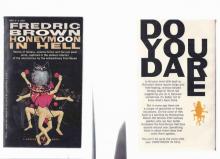 Hall of Mirrors
Hall of Mirrors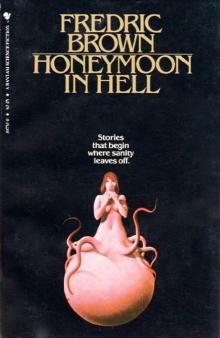 Honeymoon in Hell
Honeymoon in Hell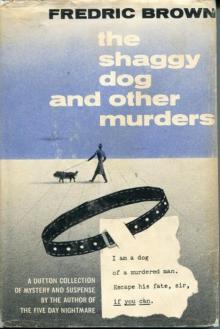 The Shaggy Dog and Other Murders
The Shaggy Dog and Other Murders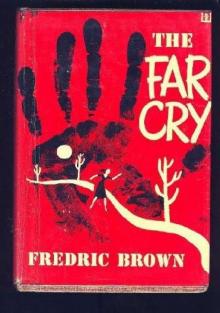 The Far Cry
The Far Cry Arena
Arena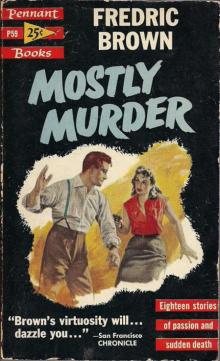 Mostly Murder
Mostly Murder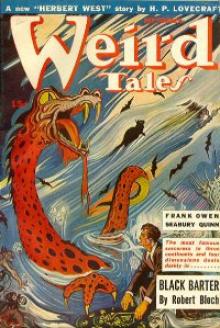 The Geezenstacks
The Geezenstacks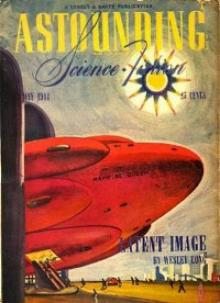 The Yehudi Principle
The Yehudi Principle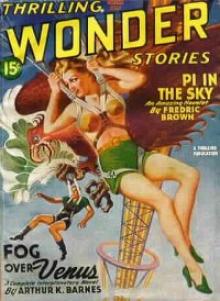 Pi in the Sky
Pi in the Sky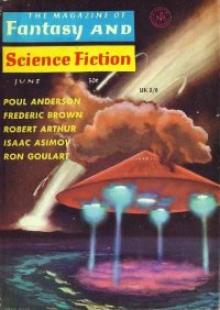 Eine Kleine Nachtmusik
Eine Kleine Nachtmusik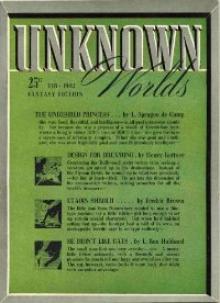 Etaoin Shrdlu
Etaoin Shrdlu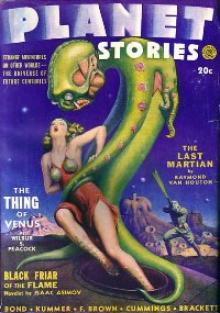 The Star Mouse
The Star Mouse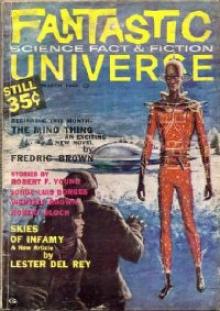 The Mind Thing
The Mind Thing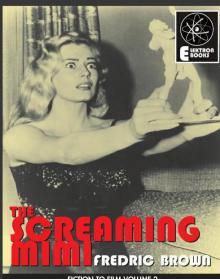 The Screaming Mimi
The Screaming Mimi The Fabulous Clipjoint
The Fabulous Clipjoint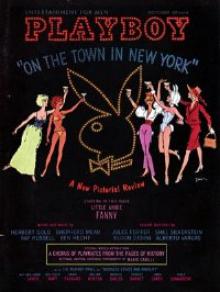 Puppet Show
Puppet Show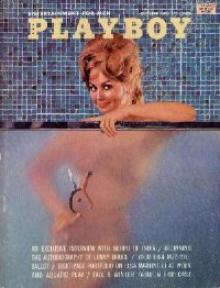 It Didn't Happen
It Didn't Happen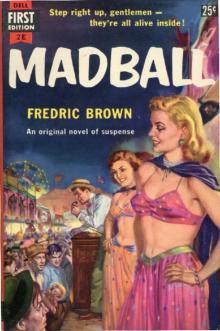 Madball
Madball Happy Ending
Happy Ending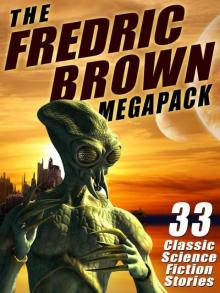 The Fredric Brown Megapack: 33 Classic Science Fiction Stories
The Fredric Brown Megapack: 33 Classic Science Fiction Stories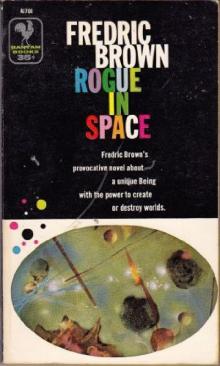 Rogue in Space
Rogue in Space Night of the Jabberwock
Night of the Jabberwock The Dead Ringer
The Dead Ringer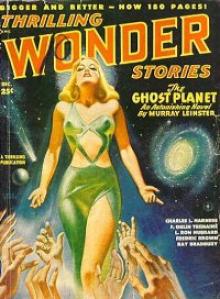 Knock
Knock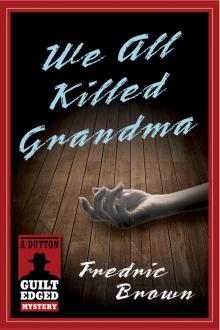 We All Killed Grandma
We All Killed Grandma Space On My Hands
Space On My Hands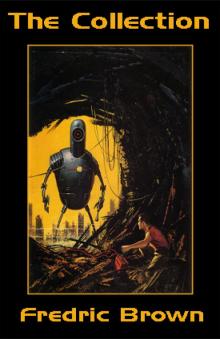 The Collection
The Collection The Second Fredric Brown Megapack: 27 Classic Science Fiction Stories
The Second Fredric Brown Megapack: 27 Classic Science Fiction Stories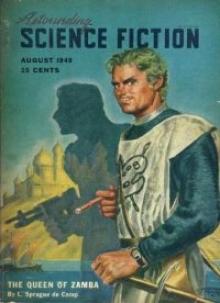 Letter to a Phoenix
Letter to a Phoenix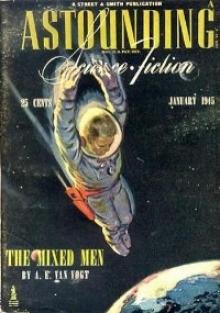 The Waveries
The Waveries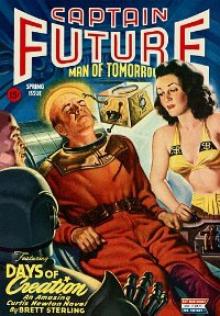 Nothing Sirius
Nothing Sirius The Deep End
The Deep End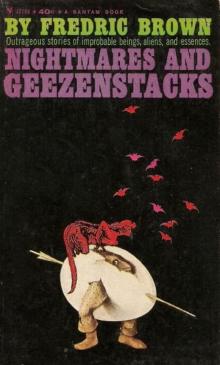 Nightmares & Geezenstacks
Nightmares & Geezenstacks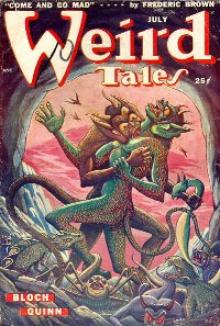 Come and Go Mad
Come and Go Mad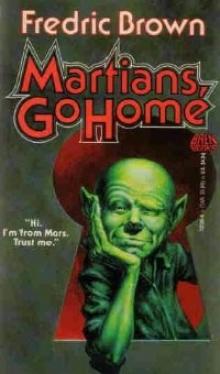 Martians, Go Home
Martians, Go Home